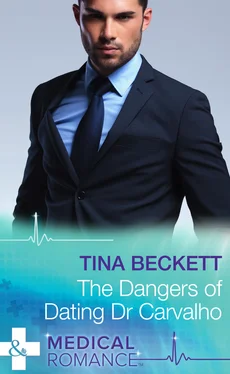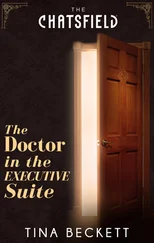Tina Beckett - The Dangers Of Dating Dr Carvalho
Здесь есть возможность читать онлайн «Tina Beckett - The Dangers Of Dating Dr Carvalho» — ознакомительный отрывок электронной книги совершенно бесплатно, а после прочтения отрывка купить полную версию. В некоторых случаях можно слушать аудио, скачать через торрент в формате fb2 и присутствует краткое содержание. Жанр: unrecognised, на английском языке. Описание произведения, (предисловие) а так же отзывы посетителей доступны на портале библиотеки ЛибКат.
- Название:The Dangers Of Dating Dr Carvalho
- Автор:
- Жанр:
- Год:неизвестен
- ISBN:нет данных
- Рейтинг книги:4 / 5. Голосов: 1
-
Избранное:Добавить в избранное
- Отзывы:
-
Ваша оценка:
- 80
- 1
- 2
- 3
- 4
- 5
The Dangers Of Dating Dr Carvalho: краткое содержание, описание и аннотация
Предлагаем к чтению аннотацию, описание, краткое содержание или предисловие (зависит от того, что написал сам автор книги «The Dangers Of Dating Dr Carvalho»). Если вы не нашли необходимую информацию о книге — напишите в комментариях, мы постараемся отыскать её.
The Dangers Of Dating Dr Carvalho — читать онлайн ознакомительный отрывок
Ниже представлен текст книги, разбитый по страницам. Система сохранения места последней прочитанной страницы, позволяет с удобством читать онлайн бесплатно книгу «The Dangers Of Dating Dr Carvalho», без необходимости каждый раз заново искать на чём Вы остановились. Поставьте закладку, и сможете в любой момент перейти на страницу, на которой закончили чтение.
Интервал:
Закладка:
The narrow scar on her lip had made something contract inside him. Maybe because he spent almost all of his vacation time treating children in developing countries with just that type of deformity. The fact that Sophia bore the telltale mark of a surgeon’s tools made his heart cramp.
There was something about the scar that struck a chord deep inside him. And touching it as she’d stood behind the desk at the nurses’ station had triggered a visceral reaction that had been both foreign and familiar. Those two sensations had warred within him for several seconds. Had he remembered the scar from their time together at the orphanage?
Possibly.
It wasn’t a real memory, per se, more a remembered emotion. Curiosity, maybe? It hadn’t been disgust. Far from it. But it seemed to mesh with his reasons for choosing pediatric reconstructive surgeries over the more lucrative types.
Pulling his focus back to the picture, he picked it up. Two adults and two children were grouped around a rickety handcart. The image was real. Not one of those staged, stick-your-head-through-the-cardboard-figure kind of thing he saw from time to time. He narrowed his eyes and tried to see the details past the sepia tones and the midline crack where the picture had evidently been folded at one time. A man stood at the metal bar across the front of the contraption and held the cart level, while a woman and baby perched on the flat bed, and the older child with a grubby T-shirt and worn flip-flops stood with his hands on his hips, legs braced apart.
Lucas swallowed. It was them—his birth family—he knew it even without being told. His mom held him close in a protective gesture, while his brother dared the world to mess with any of them.
His father already looked broken down, even back then. Staring at the picture, he tried to sense some kind of emotional connection with the figures, but felt only a vague sense of shame, which was probably left over from days gone by. His brother’s feet were the only thing that elicited a strong reaction in him. He had shoes on, while his own feet were bare. He did remember snatches of arguments he and his brother had had—with Marcos constantly railing at him for not wearing shoes in the yard.
He still preferred his feet bare, not that he got much of a chance any more with his busy lifestyle.
A soft click sounded behind him and then Sophia’s voice came again. “That’s you and Marcos with your parents.”
The fact that Sophia didn’t expect him to know what he was looking at sent another wave of shame washing over him. His adoptive parents had said they’d chosen him because the day they’d visited he’d been curled in a corner, sucking his thumb. He’d been skin and bones, and had seemed hopeless, they’d said...so much so that it had frightened them. They’d never thought about having kids of their own—although they’d worked with several children’s charities—until they’d seen him.
They’d given him opportunities that few kids in his situation would have ever dreamed of having. And that just compounded his guilt, even though Marcos and Sophia seemed to be doing just fine, judging by the high-end furniture in his brother’s apartment. In fact, the picture was the only shabby-looking thing in sight.
He set the frame back in its spot and turned toward her. “I’ll have to ask Marcos to make a copy for me.”
“Do you remember them at all?”
He hesitated. “I think I remember my father and Marcos, but not my birth mother.”
“She died when you were still a baby.” She reached back and bunched her long hair in her hand, then twisted it and tied it somehow so that it stayed up off her neck. “Your parents loved you very much, from what Marcos says. Your adoptive family must have as well.”
“They did. I guess I was lucky.”
He’d called them, in fact, after the shooting. They’d been worried sick, had wanted to come down immediately, but he’d assured them he was fine and would be back in the States soon.
Sophia turned away and walked to the glossy coffee table. “I brought the bottle of sweetener and a spoon. I wasn’t sure how much you wanted.”
Her words were tight, and he got the feeling he’d said something wrong. Was she upset because he’d been adopted and she hadn’t? Surely not. He’d had no choice in the matter. Looking back, though, he could certainly see how hard it must’ve been for Marcos to be the one left behind. But he was glad his brother had been there for Sophia.
“Thank you for the coffee.” Following her, he noted one of the clear glass mugs was filled almost to the brim, while the other was only half-full. He found out why when Sophia tipped a white pitcher of milk into the one with less coffee. He smiled. “When you say café com leite, you mean it.”
“Brazilian coffee is stronger than what you serve in the States, at least from what I’ve heard.”
A barista at a local coffee shop had jokingly referred to American coffee as “água suja” or dirty water. And compared to the dark, full brew that most Brazilians preferred, he could see why.
Sophia settled onto the sofa and took a sip of her drink with a sigh.
You could tell the apartment belonged to a bachelor by the lack of seating options. It was either sit beside her or try to perch on the low-slung easy chair to the right of it. And his side still bothered him enough that he chose the sofa over his sense of self-preservation. So once he’d doctored his coffee, he sat next to her, waiting for the surgical sites to settle down before he took his first slug.
The dark liquid was smooth, with a slightly bitter aftertaste that lingered on his palate the way good coffee should. He closed his eyes and let the scent and taste fill his senses. “I’m glad I didn’t drink the hospital’s coffee before I left. This was worth the wait.”
She smiled at him and bumped his uninjured shoulder with hers before kicking off her heels and curling deeper into the sofa. “I’m glad you like it. And thanks again for your help with that patient. I was worried you’d ripped your stitches.”
“Does that kind of thing happen often?”
“No more than at any other hospital, I suppose. You’ve never had a patient go berserk on you?”
“My patients are generally a lot smaller than that one.”
Her lips twisted. “That’s right, most of yours are probably women who are looking for a tune-up.”
“Actually, no. I work with children. I’m a pediatric plastic surgeon. I deal with...” He swallowed at what he’d been about to say and changed the words slightly. “Facial reconstructive surgery, usually after a traumatic injury.”
Her finger went to her lip, the way it had a number of other times. Surely she wasn’t self-conscious about it. No one but a surgeon who dealt with cleft lips on a regular basis would be aware of her scar. “Why do you do that?”
She didn’t ask what he meant. “Maybe because you noticed it right away.”
“I didn’t. Only after you touched it that first day.” He wasn’t about to tell her he hadn’t been looking at her lip when he’d seen her at the desk. Or that there’d been something about her that had drawn him toward her, as it did even now.
He’d thought it had been because he’d recognized her from her earlier visits, but who knew? His head had still been pretty foggy about the shooting and what had happened afterwards. Maybe he could tackle that. Get her talking so he could keep his mind off the fact that he was seated beside a beautiful woman—all alone in his brother’s house. And that he couldn’t seem to stop staring at her lips—not because of her scar but because they were pink and inviting and...
And he had to put a stop to this right now.
“Did the police tell you anything else about what happened?”
Читать дальшеИнтервал:
Закладка:
Похожие книги на «The Dangers Of Dating Dr Carvalho»
Представляем Вашему вниманию похожие книги на «The Dangers Of Dating Dr Carvalho» списком для выбора. Мы отобрали схожую по названию и смыслу литературу в надежде предоставить читателям больше вариантов отыскать новые, интересные, ещё непрочитанные произведения.
Обсуждение, отзывы о книге «The Dangers Of Dating Dr Carvalho» и просто собственные мнения читателей. Оставьте ваши комментарии, напишите, что Вы думаете о произведении, его смысле или главных героях. Укажите что конкретно понравилось, а что нет, и почему Вы так считаете.












